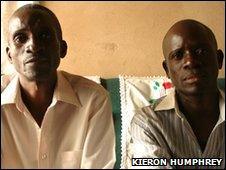Zambia court awards damages in HIV screening test case
- Published

Stanley Kingaipe (r) and Charles Chookole (l) lost their jobs
Two ex-officers in Zambia's air force have been awarded damages following claims they were tested and treated for HIV without their knowledge.
The men had claimed they were fired for being HIV-positive, but the court decided not to reinstate them.
Mandatory HIV screening is not legal in the military, and the government had denied the two men were tested.
Some think forced screening is an invasion of privacy - others say it is needed to fight the virus.
Stanley Kingaipe and Charles Chookole were each awarded 10m kwacha ($2,000, £1,400) for mental and emotional anguish by a court in Livingstone.
The decision upholds the individual's right to privacy and has re-opened the debate about mandatory HIV screening.
'Ignorant drug-taking'
Compulsory HIV tests are a contentious issue in Zambia.
Lloyd Bwalya from the Network of Zambian People Living with HIV/Aids told the BBC News website that the case will be a "signal to the rest of the country" that there should be "informed consent" before people are tested for HIV.
But Zambia's health minister and some doctors are in favour of mandatory testing, arguing that not enough people are volunteering to be tested in a country were 15% of adults are thought to be HIV positive
Mr Kingaipe and Mr Chookole were given medical tests in 2001 that they believed were routine check-ups, after which they were put on medication.
Much later, both men volunteered to be tested for HIV. It was only then they were told the drugs they had been taking were anti-retrovirals - which are used to treat HIV.
The men claimed in court that they were not given counselling or told about the importance of the drugs they had been given.
However, the Zambian government argued the ex-officers were discharged because Mr Kingaipe had cancer while Mr Chookole had developed tuberculosis.
- Published27 May 2010